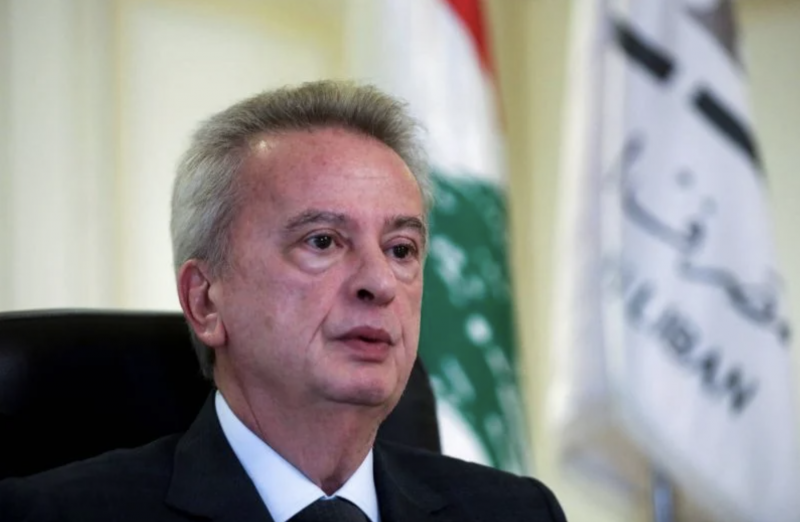
Bank of Lebanon Governor Riad Salameh during an interview with Reuters news agency in Beirut, Nov. 23, 2021. (Credit: Mohamed Azakir/Reuters)
The Public Prosecutor at the Beirut Court of Appeal, Ziad Abou Haidar, recused himself from the probe into Banque du Liban governor and his brother — a case had been entrusted to him by Ghassan Oueidat, the country’s chief prosecutor.
On Monday, Abou Haidar stepped aside from an investigation into the company Forry Associates Ltd, in which the governor of the Banque du Liban Riad Salameh and his younger brother Raja are being prosecuted.
The case was entrusted to him on Thursday by Ghassan Oueidat, the country’s seniormost public prosecutor.
The first president of the Court of Appeal of Beirut, Habib Rizkallah, will transfer the recusal request to a chamber of the same court.
If the request is accepted, Rizkallah will have to assign the case to one of the other judges of the public prosecutor of the appellate court, namely Yehia Ghabboura, Nadim Zouein, Sandra Khoury, Zaher Hamadeh, Hani Abdel Menhem Hajjar or Raja Hamouche.
The latter has already expressed his reluctance to take over the case, according to a senior judicial source who spoke to L’Orient-Le Jour.
Political rather than legal motives
Forry Associates Ltd, a company registered in the British Virgin Islands, of which Raja Salameh is the economic beneficiary, is linked to the central bank by a brokerage contract.
Between 2002 and 2015, it allegedly received $330 million in commissions on the sale of BDL financial securities.
Oueidat initiated a public action against the Salameh brothers and several other people for embezzlement, falsification, money laundering, illicit enrichment and tax evasion, referring the case to Abou Haidar.
According to a senior judicial source, Abou Haidar refrained last Thursday from handling the investigation, arguing that as a magistrate of the public prosecutor of the appellate court, the case does not fall within his competence, but within that of the magistrates of the financial prosecutor’s office.
For his part, Ali Ibrahim, the financial attorney general, refused to take up the case, according to the same source, citing “political rather than legal reasons,” without giving further details.
Two days earlier, on Tuesday, Riad and Raja Salameh’s lawyers, Hafez Zakhour and Jacques Chucrallah, tried to anticipate the process by presenting an action for state liability for gross negligence by Oueidat.
Oueidat entrusted Jean Tannous, a deputy prosecutor at the Court of Cassation, with the preliminary investigations of the case. Tannous has reportedly handed him a complete investigation file and that he was preparing to transmit it to the public prosecutor of the appellate court.
In their action against the chief prosecutor, Zakhour and Chucrallah argued that, since these were financial crimes, Oueidat should have conducted the investigation himself, or requested Ibrahim to refer the case to a financial magistrate.
The lawyers seem to have wanted to prevent Oueidat from initiating public action, knowing that, due to the lack of a quorum, the plenary assembly of the Court of Cassation, which is responsible for ruling on the appeal, cannot reach a verdict.
The assembly will not be able to meet until six of the 10 presidents of the chambers of the Court of Cassation have been appointed to the vacant posts.
However, the decree of appointment, already signed by the justice minister, is waiting indefinitely for the signature of Finance Minister Youssef Khalil, who is known to be close to Parliament Speaker Nabih Berri.
Khalil appears to be stalling the process of passing the decree which also needs the signatures of the prime minister and the president.
Zakhour and Chucrallah also seem to have favored this litigation recourse, because according to Code of Civil Procedure, from the very moment the case is filed against the magistrate, who is not notified of the action taken against them, the concerned judge no longer can take any judicial actions against the plaintiff.
For the defense team, Oueidat has no prerogative over the investigation file because legal action has been initiated against him.
According to L’Orient-Le Jour’s information, the lawyers submitted the complaint to the clerk of the Cassation Prosecutor’s Office, who did not agree to register it.
A source close to the Cassation Prosecutor’s Office said that in any case, the provision that the lawyers are invoking concerns only judicial decisions.
According to the same source, the decision of the Cassation Prosecutor’s Office to transfer the investigation to the Appeal Prosecutor’s Office is not a judicial measure, but an administrative one, since it concerns the distribution of tasks within the Public Prosecutor’s Office.
Pressure from Western judicial systems
It seems that the long-held view of the BDL governor that he should remain untouchable is no longer solid.
Prime Minister Najib Mikati said a few months ago that “during the war, you don’t change officers,” in reference to Riad Salameh.
In January, Oueidat instructed Tannous to suspend the search of several banks in a bid to retrieve the account statements of the governor's brother.
A source close to the chief prosecutor’s office denied claims that Oueidat was initially reluctant to investigate Salameh.
According to the same source, “The chief prosecutor was certainly opposed to the procedure of Tannous, but we must not forget the support he has given to the investigation for about a year and a half.”
“It is that the Swiss, French and other Western countries have provided sufficient evidence of the involvement of the Salameh brothers,” said a senior judicial source, stressing that “this evidence is an element of pressure on the Lebanese justice.”
This article was originally published in French on L'Orient-Le Jour. Translation by Sahar Ghoussoub.